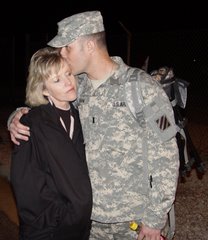BESMAYA, Iraq - Improvised explosive devices are one of the largest threats facing Coalition and Iraqi soldiers, and learning to defeat and disarm these threats has risen to one of the top priorities to leaders.
On the front lines of these battles are American explosive ordnance disposal soldiers and their Iraqi counterparts, Iraqi Police and Army members who have attended the Iraqi Bomb Disposal School here.
"IEDs are pretty much the biggest threat," said U.S. Army 1st Lt. Jeffrey Fiorico, an American senior advisor for the Bomb Disposal School.
The impact that these Iraqi soldiers and policemen make on Iraq is huge, he added.
However, before the students can go out and make the impact, they must go through two blocks of instruction at the school, which will teach them different levels of demining and bomb disposal.
The Iraqi-led courses at the school train to international demining standards during the first level of the first block of training. Here, the students learn how to work mine detectors, how to probe, and how to look for trip wires. "Pretty much everything that has to do with the basic guy in the minefield and what he does - that's level one," said Fiorico.
The next levels of the basic block of instruction introduce students to defeating improvised explosive devices, supervision and advanced demolition skills.
Although the block is known as the basic block, the course is no walk in the park. Nearly 40 percent of the soldiers who begin the class fail and don't end up finishing the course. The washout rate as it is known isn't much different than that of an American explosive ordnance disposal course, says Fiorico.
"It's the same way as the U.S.," he said. "With us, (IED defeat) gets a lot of people; here, (it) gets a lot of people too."
After the basic block is completed, the students move on to the Improvised Explosive Device Defeat block, which teaches the students advanced techniques to disarm the deadly devices.
In addition to the difficulties in the classroom, the students face stressors outside, said Iraqi Army Col. Jassim, the commandant of the Bomb Disposal School.
"We are in the middle of Iraq, and most of the time the weather here is very hot, and our men are supposed to wear the bomb suit," he said. "This is required during the training and it affects the student's concentration."
Even with all these difficulties, the students are not alone in getting through the course.
"We work hard to push the students to get their qualification from this course," said Jassim.
The school graduates approximately 18 to 36 students every other month. Once the students complete the course, they move on to face one of the most dangerous jobs in the world.
In addition to disarming weapons placed by insurgents, the group also faces mine fields on the border of Iran, which were laid during the countries' war.
"We try to put in their heads that, ‘Hey, you're not any old troop,'" said Fiorico. "I'd say they leave here with a sense of accomplishment when it's all said in done.
Saturday, February 16, 2008
Subscribe to:
Post Comments (Atom)





No comments:
Post a Comment